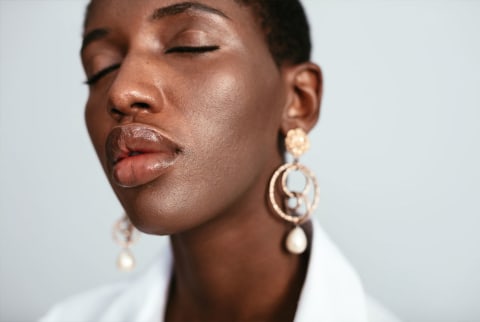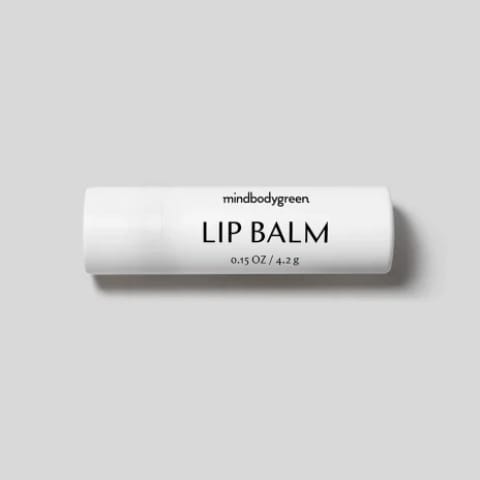Lips Lose Volume & Literally Deflate With Age — How To Stop It
With time, lips lose volume and become thinner. Here's what to do about it.


mbg Beauty Director
mbg Beauty Director
Alexandra Engler is the beauty director at mindbodygreen and host of the beauty podcast Clean Beauty School. Previously, she's held beauty roles at Harper's Bazaar, Marie Claire, SELF, and Cosmopolitan; her byline has appeared in Esquire, Sports Illustrated, and Allure.com.
Image by BONNINSTUDIO / Stocksy November 3, 2023 We carefully vet all products and services featured on mindbodygreen using our Our selections are never influenced by the commissions earned from our links. As we age, our skin changes. This is simply a natural part of life: We all get older, and our bodies change because of it. With the skin, these changes are due to a variety of factors that include increased dryness, environmental damage, hormonal fluctuations, and loss of structural proteins such as collagen and elastin. One area that people often notice a change is the lips: With time, they lose volume and become thinner. Now, not everyone finds this to be a major concern (some people simply don't notice it happening, in the same way some never get forehead wrinkles or under-eye bags; all our faces are different and respond differently). However, if you notice that this is a problem for you, there are steps you can take to help enhance your lips and protect them from damage.Why lips thin as we age
Lips thin and lose volume with time. It's a natural part of the aging process and can be attributed to natural decreases in and under the skin, such as loss of collagen, fat, lipids, and humectants like hyaluronic acid. When the natural production of these starts slowing, the skin will appear less plump and supple.
When we lose this precious collagen, our skin's structural integrity declines and our overall volume diminishes. Essentially, our lips deflate with time.
And unfortunately, this process starts earlier than you might expect: Your 20s (yikes!), and continues at about a 1% loss every year after.
"Our bodies always balance collagen production and degradation," says board-certified dermatologist Gary Goldenberg, M.D., assistant clinical professor of dermatology at the Icahn School of Medicine at Mount Sinai in New York. "When we are young, our bodies produce more collagen than we break down. That balance tips the wrong way with age since tissue regeneration decreases."
That’s not all, hyaluronic acid also decreases with age. HA is the key molecule involved in skin moisture, meaning it plays a huge role in the skin's aging process. According to Nigma Talib, N.D., a naturopathic doctor, our body's natural reserve of HA diminishes greatly over time. She says that by the time we reach our 40s, we have just 50% of the HA we had during our younger days.
Finally, so does fat. People naturally lose facial fat as they get older–we've even nicknamed it "losing the baby fat." Specifically with the lips, the fat pads under the skin is what gives them that cushiony shape. How and to what extent folks lose fat varies quite a bit, but starting at some point in your 20s this change will start happening. Unfortunately, facial fat loss is not something easily controlled.
How to support thinning lips
The good news is there are a lot of options for plumping lips—from professional intervention to daily skin care treatments.
Protect the delicate skin
The most important thing you can do is protect the skin from damage, which means shielding it from stressors like UV exposure, inflammation, and irritating ingredients. Here’s how to do that: Use a SPF-infused lip balm when spending time in the sun, avoid irritating topicals that may damage the skin barrier (such as essential oils, strong acids, and caspian), and don’t pick at the skin.
Hydrate with a skin barrier supporting & hyaluronic acid infused balm
Just like the rest of your skin, your lips need consistent hydration. This is where your trusty lip balm comes in. Look for a lip balm that supports the skin barrier by using a combination of humectants, emollients, and occlusive ingredients.
This balance does a few things for the lips. First, humectants (such as hyaluronic acid) attract water. Think of them as super magnets for moisture. While they're good at pulling water in, they're not as talented at keeping it there. Left to their own devices, they'll end up drying the skin out. This is why they need to be paired with emollient and occlusive ingredients.
Emollients soften and condition the skin—sinking in, filling in cracks in the barrier, and restoring lipids. These are the nourishing ingredients, such as moringa seed oil, castor oil, butters, and vitamin E. Occlusive ingredients (such as your waxes and thick oils) create a seal over the skin, trapping moisture underneath and protecting the epidermis from drying out.
Use a lip plumper for a temporary boost
The new crop of lip plumpers have taken the internet by storm. The accolades are deserving, too: Using innovative ingredients and delivery systems, these formulas are able to perform some plumping magic.
Recently mindbodygreen beauty editor Jamie Schneider took several new options to task—and this was her investigation of her favorites.
The takeaway
Volume loss is a natural part of the aging process, but with proactive skin care tips you can keep your lips looking plump and supple for longer. And if all else fails, just cheat a fuller pout with this makeup trick.

 Troov
Troov 


































